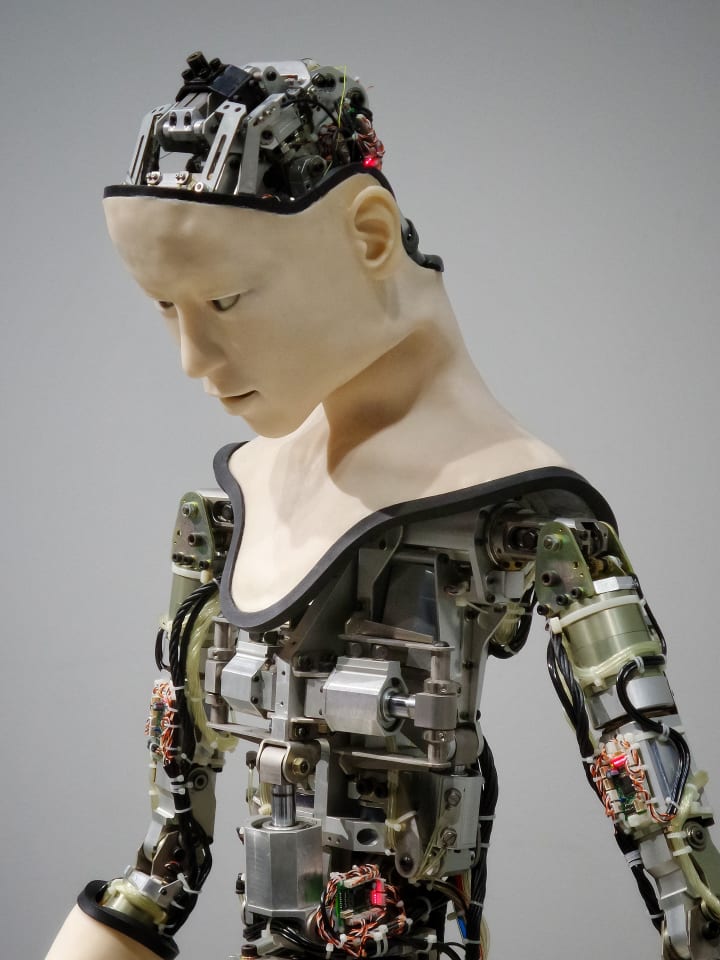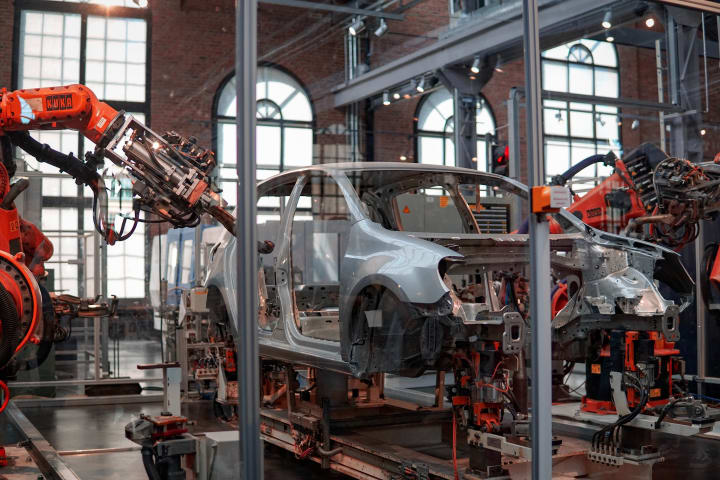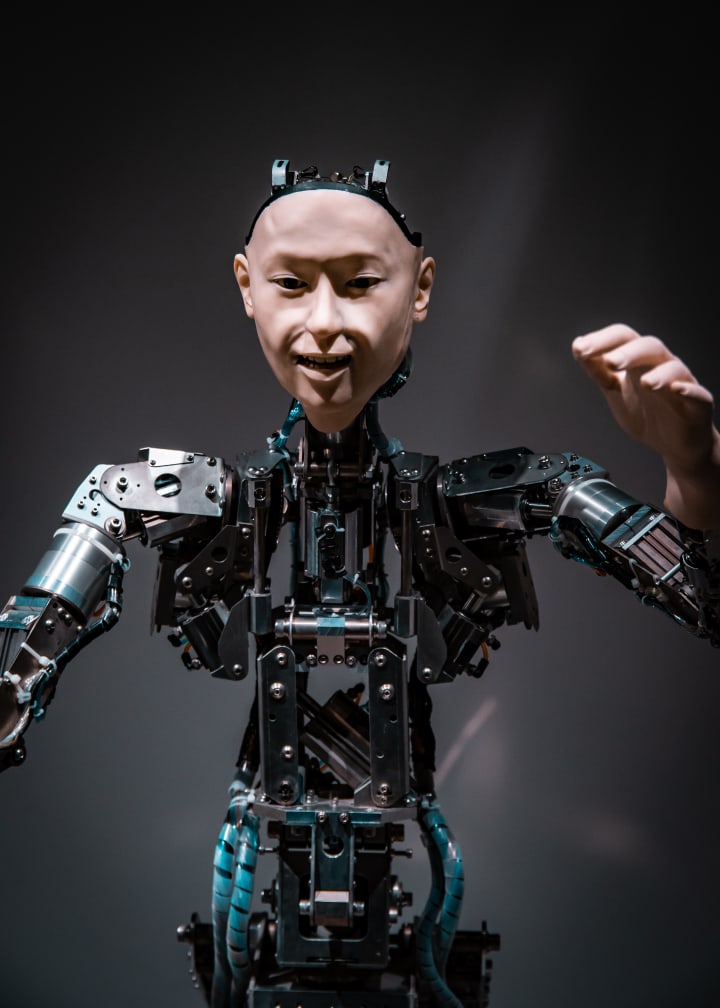
The Universal basic income is a model that provides all citizens a specific monthly sum of money, regardless of their employment status or income. Its purpose is to reduce poverty.
To understand why this model will become a necessity in the future, let’s look at the past first, in order to understand some stages through which the evolution of society went so far, and then try to predict the further evolution, based on this pattern.

The Abolition of Slavery
Before the abolition of slavery, nobody could imagine a world without slaves. Yet the technological evolution led to the slaves being freed. Why? It’s simple. Until that point, the economy was mainly based on agriculture and on raising animals. There were no machines and human labor was the only one that could deal with this type of agricultural work. Around the 18th century, technology started to evolve and the first machines began to be used in producing goods.
Therefore 2 issues appeared, related to these new machines, 1. the need to use money, which could be exchanged for mass-produced goods, and 2. the need to get a workforce to operate the machines and create goods.
1. The goods produced by those machines had to be sold, so money became more necessary than it was in the past.
In the past, people preferred barter instead of the sale. Barter was convenient for several reasons: anyone preferred exchanging 5 eggs for a piece of cheese (and not paying money for it) because foods would go bad quickly (there were no fridges to preserve food) and barter was a more rapid, direct type of exchange, but also because money was scarce. The economy was centered around the home and people would have small chances to get money from something like a job, situated outside of their own house and the piece of land around it.
Yet, the beginning of industrialization imposed the use of money. (It also led to the migration of people from the countryside to the cities). Machine-produced goods could only be sold, not exchanged for other goods. For buyers to get money, jobs needed to be created so that people could exchange their work for money and their money for goods.
2. Workforce became a necessity. All the newly created machines had to be operated by humans.
Starting with the 18th century, agriculture was no longer as profitable as it used to be before that time. The industry started bringing more profit since it used both humans as well as machines, and that method lead to higher efficiency and productivity. (This was also the reason why the nobility was brought down by the bourgeoisie. The nobility earned their income mainly from agriculture-and only used human labor, no machines-, while the bourgeoisie earned their income from the new industrial machines +human labor. Since agriculture was no longer profitable in the 18th century, the nobility class collapsed, being replaced by the more adaptable bourgeois class, who was making a substantial profit by using machines and human workforce combined).
Under these circumstances, slavery was no longer profitable, because it only used the human workforce alone and therefore had lower productivity than humans + machines combined.
Freed slaves could now work in the new manufactories and factories. They would operate the new machines, fabricate goods, and earn money. Then they could spend their money buying the goods they themselves had produced in factories. A working economy is one where money and goods are constantly exchanged. This is the model by which the new economy began functioning from the 18th century on, thanks to technological development and the emergence of machines.
This is how the creation of machines rendered the slave work useless and led to the abolition of slavery and it represented an important step in the evolution of man (but also in the evolution of machines, that were later to develop into the cybernetic life we know today, and which seemingly has developed symbiotically with the human species).

The Emancipation of Women
Similarly, the emancipation of women and their right to study and work was also connected to technological development. Until the beginning of the 20th century, no one could imagine seeing a woman work. Women's place was at home, to care for the children (because there were no kindergartens), to wash the clothing (because there were no washing machines), to cook food daily (because there were no fridges and food would go bad), to clean the house (because there were no vacuum cleaners), etc.
Towards the end of the 19th century, technology had developed enough and the first household machines were created (washing machines, fridges, or vacuum cleaners). These machines could now do the housework, therefore giving women the time needed to work in factories and earn money. Women would then spend this money by buying the things they themselves created while working in the factories (they could buy the washing machine they had built themselves in the factory).
This is how the new technological developments led to the emancipation of women, as well (the 2 World Wars only accelerated the process, by forcing women to replace men in factories and other jobs, although it came at the cost of many men losing their lives on the battlefield -between 50–80 million deaths-).

The Cybernetic Regnum and the Changes It Brings
Presently we are on the brink of a new technological change. The structure of our machines has changed so drastically, that we can now even talk about a new regnum, ”the cybernetic regnum”. Is this a too bold affirmation? Perhaps not. Cybernetic structures are systems, just like plants and animals, and they possess intelligence. Is life defined by self-awareness? No, since simple biological organisms have no self-awareness. Let’s take the example of a bacteria or of a tree. Those entities are functioning as a system, their life is represented by a chain of chemical reactions, thus they function and this means they are life forms.
Similarly, is that same thing not true about cybernetic structures as well? They are systems, too, they have electrical chain reactions that define their functioning, or “life” if you prefer to call it so. Can they therefore not be considered life forms? And by the characteristics that make them similar to the biological regnums (plant and animal regnums) can they not be considered to be a regnum of cybernetic life themselves? Although so far they don’t seem to have self-awareness yet, that is due to the fact that they are still primitive. But just like the animal regnum, they constantly evolve and soon they will be more intelligent and get self-awareness as well. Think about the social robot Sophia, she is developing her own personality, has her own memories, and can make logical connections between ideas to become creative. Does she not resemble intelligent animal life forms by its self-awareness?

As we can see nowadays, robots and the new technology are leaving us without jobs, since machines replace human work more and more in every domain. Machines have become so intelligent that they do the human work better, more precisely, they never make mistakes, they never get tired (they can work day and night without a break), they don’t need sleep, food, or water, they only feed on energy. Moreover, if they get broken, they can be easily repaired or replaced, and they do not need health insurance or a pension, because they will never be retired (they will literally die at work). Besides those advantages, they will never ask for better working conditions, they will never ask to have a trade union and they will never strike, asking for their rights. And they never get paid, because they do not need a wage to feed their family.
It is precisely here that the problem begins. For an economy to work, goods have to be produced, and people need to buy those goods by paying money. Machines do not get wages, nor will they buy the products they make. What would that mean? Economical collapse. Yet machines are more efficient than humans in manufacturing those goods, so we can’t stop using robots and hire humans instead.
So what would the solution be to having machines work and produce goods and still have someone buy those products to keep the economy going? More people will be replaced by machines and lose their jobs, thus they will no longer have the money to buy the goods produced by the machines.
The only way such an economy can keep functioning and not collapse is to give people the money necessary to buy the goods produced by machines.

This, in my opinion, is why the Universal basic income will become a necessity in the future for two simple reasons:
There will be fewer jobs available to people since machines will replace the workers.
To make the economy work, money must circulate, thus money and goods must be exchanged. The goods produced by machines can only be bought by humans (since machines don’t need goods or money). Only people need these goods, so they will be given the necessary money as Universal basic income to be able to spend it and make the economy work.
Of course, this change will not happen so soon, but it is very likely to happen in the future, as an effect of the evolution of intelligent life on the planet.
Some countries have tried to implement, experimentally, the Universal basic income, and have noticed that it was beneficial to eradicating poverty and even to reduce the number of stress-related diseases. Nevertheless, it seems that globally, the technology has not yet reached a level of development high enough to impose the implementation of the Universal basic income. But, in the summer of 2021, the California legislature has approved the first-ever state-guaranteed income program, thus opening the way for such a change in the world.

Where Does the Money Come from for this Universal Basic Income?
Now you will probably ask me 2 questions: 1. Will all jobs be performed solely by machines? and 2. Machines don’t pay taxes, so where does the money come from for this guaranteed income?
I would answer the first question with a simple ”no”. Humans will still find some jobs, nevertheless, a certain percentage of people will probably be unemployed, due to the apparition of intelligent machines, which can do the same job far more accurately than humans. Machines need no rest, no food, no rights, no family to feed, no wage, and no pension since they will literally die working (machines can work 24 h/day, and when they break they are replaced by better models). Robots are already so smart that they have become creative. They can compose music (Shimon, a robot at the Georgia Institute of Technology can not only play but also compose music), paint, or write poetry (the Ai-Da robot writes poetry at an incredible speed but has also learned how to paint).
Since evolution has always meant the apparition of new structures, I also tend to believe that unemployed people will be able to create new types of jobs, that never existed before. Think about new jobs such as crypto miner, game tester, Youtube travel vlogger, and so on. The future will open great possibilities, although at the moment some of those developments are hard to predict.

To answer the second question, regarding the taxes and who will pay them, let’s analyze a bit the tax model that is used nowadays.
Let’s take the model of a company that has employees. Taxes are paid to the state by 1. the company on the one hand and 2. by the employees on the other, as a percentage of the income they have obtained by performing their activity.
So we have 2 tax sources:
1. The company pays taxes based on its income.
2. Employees pay taxes for the income they have made.
Now we remove the employees and we replace them with machines. What do we have now?
1. The company has a much higher profit because of 2 reasons:
- it no longer pays wages to the employees and
- the robots can work 24/7, 7 days a week (which is something a human could never do, practically one robot's work equals that of more than 3 humans since an employee only works 8 h/day and needs weekends and holidays off)
2. Robots do not get paid (because they belong to the company, just like slaves used to belong to the owner) and all the profit they create belongs to the company. Therefore they cannot pay taxes since the profit is not the profit of the robot, but it belongs to the company that owns the robot.
Thus, with this new model, it is the company alone that has to pay taxes for its income, and no longer the employees, because it has no employees. But because now the company's income includes the income that used to be made by the employees, it has to pay taxes to the state for that income as well.
The state will thus receive the same amount of tax money it used to receive from the company+ the employees, but this money will now be paid only by the company.
Now the question that arises is: if the robots create goods, but people are unemployed and cannot afford to buy them, who will buy those goods? Robots don't have money and they don't need a new fridge, a new T-Shirt, or a new TV set. Humans do need those things, but they have no money to buy them since they are unemployed.
Would such an economic model not collapse? Tons of goods are manufactured but cannot be sold, because the only ones who need them have no money to buy them. As I already mentioned, for an economy to work, money and goods must be continuously exchanged.
To solve this issue, people should be given the money necessary to make this new, modern type of economy work, whether they have a job or they are unemployed. This is why I consider that it is the development of cybernetics that imposes the application of the Universal basic income.
And we should also think about another aspect, the humanitarian aspect. The more robots take over human jobs, the more humans will be unemployed. Are we simply going to condemn all these people to starvation, while tons of goods are being produced in factories yet nobody affords to buy them? Would that be an ethical policy?






Comments
There are no comments for this story
Be the first to respond and start the conversation.